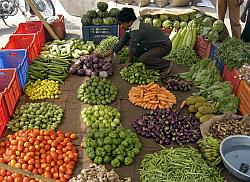Wholesale prices likely rose at their slowest annual pace in more than three years last month, strengthening the chances of a rate cut at the RBI policy meeting next week, according to a Reuters poll of economists.
 February's deceleration would be the fifth in a row, bringing inflation closer to the Reserve Bank of India's perceived comfort level of around 5 percent as it comes under pressure to shore up economic growth.
February's deceleration would be the fifth in a row, bringing inflation closer to the Reserve Bank of India's perceived comfort level of around 5 percent as it comes under pressure to shore up economic growth.
The (WPI), the key inflation measure, rose 6.54 percent last month - the slowest annual rise since November 2009, according to the median forecast of 30 economists. The reading was 6.62 percent in January.
Core inflation, which excludes volatile food and fuel prices, has been easing since September 2012 and the trend probably continued last month, helped by a favourable statistical base from a year ago.
"The marginal drop in the rate of inflation will be driven by a further easing of
core inflation, and a lower monthly rate of food inflation," said Aninda Mitra, India economist at Capital Economics.
"Softening core inflation should spur an easing of monetary policy at the RBI's March 19 meeting," added Mitra, who is expecting the central bank to cut the key repo rate by 25 basis to 7.50 percent.
The headline inflation rate, which averaged around 9 percent since 2010, began easing last October and has since averaged just over 7 percent.
Sticky inflation prevented the RBI from easing monetary policy for much of last year, and after cutting its key repo rate this January it struck a cautious note on further moves.
Indeed, an HSBC purchasing managers' survey showed prices rose at a faster pace in February, suggesting upward pressure on inflation remains.
"If inflation remains sticky at 6 percent levels, the room to cut will be limited. We don't see rates coming off sharply," said Yuvika Oberoi, economist at Yes Bank, who expects inflation to remain at those levels through the year.

 February's deceleration would be the fifth in a row, bringing inflation closer to the Reserve Bank of India's perceived comfort level of around 5 percent as it comes under pressure to shore up economic growth.
February's deceleration would be the fifth in a row, bringing inflation closer to the Reserve Bank of India's perceived comfort level of around 5 percent as it comes under pressure to shore up economic growth.